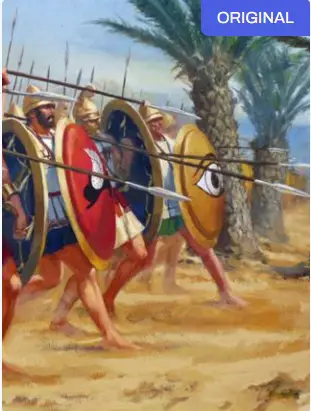

Greek Hegemon in the Mediterranean
Greek Hegemon in the Mediterranean by Purple_Sea is a fantasy novel. There are several great forces at play during this period, including the enormous Persia, the forcibly established Sparta, Athens with its commerce and trade, aspirant Macedonia, the twin heroes of the Western Mediterranean, the burgeoning Rome, and others. Read Greek Hegemon in the Mediterranean Blurb Below.
The Mediterranean, a cradle of civilization, shimmered under a relentless sun. This vast blue expanse, a vital artery of trade and conflict, throbbed with the pulse of a thousand ambitions. The 4th century BC was a crucible of power plays, a clash of ideologies, and a vibrant tapestry woven with the threads of war, philosophy, and innovation.
On the grand stage of history, several powerful actors strutted their stuff. In the east, the colossal Persian Empire, a sprawling giant, cast a long shadow. Its vast resources and seemingly endless manpower were a constant source of concern for the smaller states nestled along the Mediterranean coast.
Closer to home, the situation was far from static. Sparta, once a ruthless military machine, now bore the scars of past victories. Its rigid social structure and dwindling citizen population hampered its ability to maintain its hegemonic grip. Yet, the Spartans remained a formidable force, their warriors still feared for their discipline and unwavering resolve.
Meanwhile, Athens, the city of philosophers and playwrights, had undergone a dramatic transformation. Its bustling marketplace hummed with the activity of merchants and artisans. Athenian ships crisscrossed the Aegean, establishing trade routes and spreading the influence of Athenian democracy. However, whispers of discontent began to rise, fueled by the city’s growing dependence on its vast empire and the resentment of its subjugated allies.
In the north, a new threat was stirring. Macedonia, a kingdom long considered uncultured and peripheral, was undergoing a metamorphosis under the iron fist of King Philip II. This ambitious ruler, a master strategist and ruthless politician, drilled his armies into a cohesive fighting force, laying the groundwork for Macedonia’s future dominance.
Across the sea, another contender was emerging. Rome, a burgeoning republic, was consolidating its power on the Italian peninsula. Its citizens, a blend of patricians and plebeians, were bound by a fierce sense of civic duty and a hunger for expansion. Though still a fledgling power compared to the established empires, Rome’s military prowess and relentless ambition were undeniable.
These political machinations were intricately woven with the intellectual ferment of the time. Renowned figures like Aristophanes, the playwright, used satire to skewer the follies of Athenian democracy. Hippocrates, the “Father of Medicine,” revolutionized medical practices by emphasizing observation and reason. Pythagoras, the mathematician and philosopher, delved into the mysteries of numbers and their relationship to the universe. Democritus, the “Laughing Philosopher,” questioned established beliefs and championed the pursuit of knowledge. And Plato, the student of Socrates, laid the foundation for Western philosophy by exploring themes of justice, knowledge, and the ideal society.
This era was a vibrant clash of ideologies. Democracy jostled with tyranny, while philosophical schools debated the nature of reality and the meaning of life. New ideas challenged old traditions, and the very fabric of society was being re-examined.
At the forefront of this exhilarating and often tumultuous period stood a cast of remarkable individuals. Agesilaus II, the last great king of Sparta, clung stubbornly to the city’s rigid traditions. Epaminondas, the brilliant Theban general, masterminded a strategic victory that shattered Spartan dominance. Dionysius, the ruthless tyrant of Syracuse, ruled with an iron fist, while Camillus, the legendary Roman dictator, earned the title “Second Founder of Rome” by defending the city from a Gallic invasion.
The 4th century BC in the Mediterranean was a time of breathtaking dynamism. Empires rose and fell, philosophies flourished, and individuals with exceptional talent shaped the course of history. It was an era that would leave an indelible mark on the world, setting the stage for the rise of Rome and the flowering of Greek and Roman thought that continues to influence us today. This is the story of a world on the cusp of change, where the seeds of the future are being sown, where ambition and intellect collide, and where the very idea of what it means to be human is being debated under the unrelenting gaze of the Mediterranean sun.
READ: Soul King System
You can use the link below to read Greek Hegemon in the Mediterranean online
Introduction Enemies by Chance, Lovers by Choice by Wonderful follows Ayra Malik, a hardworking casino…
Introduction The Billionaire and His Ex-con Woman by Morning Dew follows Bane Reed, a woman…
Introduction My Idol Is an Alpha by Mrs. Virgo follows Elea Jemima, a spirited college…
Introduction The Lycan Alpha Doesn’t Know Me by Obasichukwuemeka54 follows Emma Collins, a woman who…
Introduction Revenge of the Contract Bride by Princess Honey follows Olivia, a woman who sacrifices…
Introduction My Manipulative Tycoon's Relentless Desires by Rabbit follows Irene Dixon, who makes a desperate…